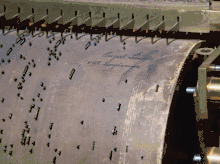The Piano Roll Blues or Old Piano Roll Blues is a figure of speech designating a legal argument (or the response to that argument) made in US patent law relating to computer software. The argument is that a newly programmed general-purpose digital computer is a "new" machine and, accordingly, properly the subject of a US patent.[1]

This legal argument was made in Gottschalk v. Benson in Benson's brief. The government then responded in its brief that this amounted to asserting that inserting a new piano roll into an existing player piano converted the old player piano into a new player piano.[2] After Benson, the Court of Customs and Patent Appeals took the position that the reasoning of Benson did not apply to "machine" claims, such as a claim to a conventional digital computer programmed to carry out a new algorithm or computer program.[3] In dissenting from that judgment on the grounds that the Supreme Court in Benson did not limit the principle to method claims, Judge Rich spoke of "the legal doctrine that a new program makes an old general purpose digital computer into a new and different machine." Id. at 773. He observed that the doctrine "partakes of the nature of a legal fiction when it comes to drafting claims." Id.
The argument appeared again two decades later in the majority opinion in In re Alappat,[4] and in his dissenting opinion in that case Chief Judge Archer discussed the figure of speech extensively, concluding:
Yet a player piano playing Chopin's scales does not become a "new machine" when it spins a roll to play Brahms' lullaby. The distinction between the piano before and after different rolls are inserted resides not in the piano's changing quality as a "machine" but only in the changing melodies being played by the one machine. The only invention by the creator of a roll that is new because of its music is the new music.[5]
Despite a strong indication in the Supreme Court's Gottschalk v. Benson opinion that computer implementation of an otherwise patent-ineligible abstract idea (in that case a mathematical algorithm) was insufficient to transform the idea into patent-eligible subject matter, the Federal Circuit continued sporadically to assert the piano roll blues argument.[6] A very recent example was in a dissenting opinion of Chief Judge Rader in 2013.[7]
The Supreme Court's opinion in the Alice case[8] may have finally put a stop to the piano roll blues argument, since it states that simply saying "apply it with a computer" will not transform a patent-ineligible claim to an idea into a patent-eligible claim.[9]
The expression apparently derives from a song popular in the 1950s—"The Old Piano Roll Blues" by Cy Coben[10] — in the style of a Scott Joplin rag. As Judge Archer points out in his Alappat dissent, there is also an allusion to the decision of the Supreme Court in White-Smith v. Apollo, concerning copyright protection for piano rolls.
References
- ↑ The case most often cited for the argument is In re Bernhart, 417 F.2d 1395, 1400 (CCPA 1969), but a slightly earlier formulation of the argument occurs in In re Prater, 415 F.2d 1393, 1403 n.29 (CCPA 1969).
- ↑ For a discussion of the use of the Old Piano Roll Blues in Benson and subsequent cases, see, for example, Chapter 8: Patent Protection of Software: Statutory Subject Matter in the Supreme Court and the Federal Circuit; A. The Supreme Court Trilogy on Statutory Subject Matter, George Washington Law School. A discussion of the history and current status of the piano roll blues is found in Richard H. Stern, Alice v CLS Bank: US Business Method and Software Patents Marching towards Oblivion?, [2014] Eur. Intell. Prop. Rev. 619, 620.
- ↑ In re Johnston, 502 F.2d 765 (CCPA 1974), reversed on obviousness grounds sub. nom. Dann v. Johnston, 450 U.S. 175 (1976).
- ↑ In re Alappat, 33 F.3d 1526, 1545 (Fed. Cir. 1994) ("We have held that [] programming creates a new machine, because a general purpose computer in effect becomes a special purpose computer once it is programmed to perform particular functions pursuant to instructions from program software.").
- ↑ Judge Archer also said that in making this argument the majority opinion "resurrects long-dead precedent of the Court of Customs and Patent Appeals in direct conflict with Supreme Court precedent and subsequent precedent of that court."
- ↑ See, e.g., In re Alappat, 33 F.3d 1526 (Fed. Cir. 1994) (en banc).
- ↑ CLS Bank Int'l v. Alice Corp., 717 F.3d 1269, 1302 (Fed. Cir. 2013) (opinion of Rader, J., concurring).
- ↑ Alice Corp. Pty. Ltd. v. CLS Bank Int'l, 573 U.S. __ (2014).
- ↑ Alice, slip opinion. at 10 ("We conclude that the method claims, which merely require generic computer implementation, fail to transform that abstract idea into a patent-eligible invention."), 13 ("These cases demonstrate that the mere recitation of a generic computer cannot transform a patent-ineligible abstract idea into a patent-eligible invention.").
- ↑ Music, Words, Sung (by Al Jolson).